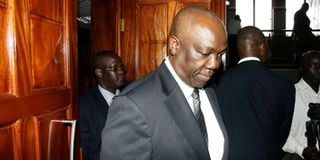NIS silent on polls meddling charge as Ruto cries foul

NIS Director-General Phillip Kameru. The agency headed by Kameru never comments publicly on its work and by law is supposed to be politically neutral.
Interior Principal Secretary Karanja Kibicho’s claims that a National Intelligence Service (NIS) poll gave Azimio la Umoja One Kenya Coalition Party presidential candidate Raila Odinga a clear win over Deputy President William Ruto have opened the Pandora’s Box.
His assertions provoked a furious reaction from Dr Ruto’s Kenya Kwanza alliance, which is now calling for investigations over whether the NIS is being used for prepare ground for rigging the 2022 elections. The agency headed by General Philip Kameru never comments publicly on its work and by law is supposed to be politically neutral.
By virtue of his office as PS in charge of national security, Mr Kibicho exercises a supervisory role over NIS and would be privy to the regular intelligence briefings President Kenyatta gets.
Under fire
His comments amplify the fact that he had already been under fire from Kenya Kwanza for openly campaigning for Mr Odinga’s presidential bid in defiance of the public service code of ethics.
Dr Ruto’s campaign has also complained against Mr Kibicho’s boss, Cabinet Secretary Fred Matiang’i, and cabinet colleagues Joe Mucheru (ICT), Peter Munya (Agriculture) and Eugene Wamalwa (Defence), who have all been on the Odinga campaign. The CS’s, however, insist that they are not barred from political activity unlike PS’s and other civil servants.
Interestingly, the DP in the run-up to the 2017 elections was the one under fire from Mr Odinga over the alleged use of NIS for political purposes.
In his first reaction to Kibicho, Dr Ruto had denied that any such NIS poll findings existed, claiming that he was in possession of the genuine intelligence data showing him leading Mr Odinga by eight percentage points. Though he has often complained of being side-lined in the government, the DP now insists he receives intelligence briefs even before the President.
Mr Kibicho ignited the fire when he told Citizen TV on the eve of Madaraka Day that Mr Odinga would secure 60 per cent of vote: “It is a first round win. This is intelligence data and that’s what it’s saying.”
By virtue of his office, the DP is a member of the National Security Council, the country’s top most security organ chaired by President Kenyatta and whose members include NIS Director-General Phillip Kameru.
No longer attends NSC meetings
Insiders say Dr Ruto no longer attends NSC meetings after falling out with President Kenyatta more than two years ago. Dr Kibicho is not a member of NSC, but sits in the National Security Advisory Committee (NSAC) which is chaired by Head of Public Service Joseph Kinyua.
Both NSAC and the NSC have access to high level and classified intelligence. By law, NIS is supposed to be politically neutral, but it routinely gathers and analyses information on the political situation alongside its work assessing and giving advice on social and economic situations that may have a bearing on security, as well as other internal and external security threats.
It is how that information is used that can be a hot potato. Under President Kenyatta, NIS remained one of the most powerful security organs in the country, with the director-general often reporting directly to the Head of State. Sensitivity of the job has always meant that a new President appoints a trusted person to head the agency.
In its letter to the Intelligence Service Complaints Board, the DP Ruto’s United Democratic Alliance (UDA) has claimed that the state is misusing national security organs to advance Mr Odinga’s political interests.
Gen Kameru did not respond to our queries on whether the NIS was being used to tilt the election in the favour of Mr Odinga as claimed by Dr Ruto.
Amorphous nature
The agency’s amorphous nature has not helped things as the recurring political noise has made it impossible to tell whether the spy agency is just a punching bag for politicians whenever things don’t go their way or if it indeed does get its hands dirty whenever required. In 2010, the predecessor to NIS, the National Security Intelligence Service (NSIS) was accused of making a secret change to a draft of the proposed constitution while it was at the Government Printer.
Two words, “national security”, were mysteriously added to clause 24(1)(d) on the limitation of the Bill of Rights.
This would have allowed fundamental rights to be suspended at any time on grounds of national security. It took the intervention of a whistle blower who forced then Attorney General Amos Wako to withdraw the doctored document.





